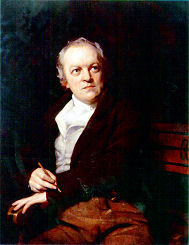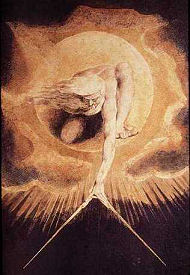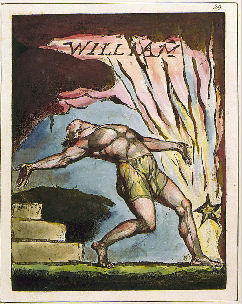
 William Blake
William Blake

 William Blake
William Blake
William Blake, English poet, painter, and engraver (1757 - 1827), is the Romantic movement poet with the greatest reputation for being a visionary mystic. A few famous lines of his poetry are frequently quoted to express mystical experiences or psychedelic revelations:
If the doors of perception were cleansed every thing would appear to man as it is, infinite.
 Aldous Huxley quoted this line for the title of his book
about mescaline hallucinations, The Doors Of Perception. Jim Morrison
named his rock group The Doors after that book and wrote many dark songs
reflecting his interests in acid trips, shamanism, psychology, etc. The book William Blake: The Seer And His Visions by Milton Klonsky
describes an LSD trip in its introduction and even recent books on religion
continue the association, Cleansing The Doors Of Perception: The Religious
Significance of Entheogenic Plants and Chemicals by Huston Smith. It has
even been suggested that Blake's visions may have been due to ergot, the fungus
which infests grains like wheat or rye, which was originally the source of LSD.
Aldous Huxley quoted this line for the title of his book
about mescaline hallucinations, The Doors Of Perception. Jim Morrison
named his rock group The Doors after that book and wrote many dark songs
reflecting his interests in acid trips, shamanism, psychology, etc. The book William Blake: The Seer And His Visions by Milton Klonsky
describes an LSD trip in its introduction and even recent books on religion
continue the association, Cleansing The Doors Of Perception: The Religious
Significance of Entheogenic Plants and Chemicals by Huston Smith. It has
even been suggested that Blake's visions may have been due to ergot, the fungus
which infests grains like wheat or rye, which was originally the source of LSD.
However, Blake makes it clear that he considered his visions to be due to his artistic and poetic genius. He revered his imagination to such an extent that he came to regard it as having a spiritual significance. Blake became strangely fierce in his defense of the imagination and even went so far as to mount attacks upon Newton and Locke and industrialization because he felt science and reason threatened the world of the imagination. In the mythology of his prophetic books, Urizen is the god of reason battling the god of passion and creativity, Orc. How Blake regarded his own visions is examined in June Singer's book Blake, Jung, And The Collective Unconscious on page 239, "Blake would candidly confess that his visions were not literal matters of fact, but phenomena seen by his imagination, realities nonetheless for that, but transacted within the realm of the mind."
 Peter
Ackroyd's biography of Blake frequently describes him as being something of a
dreamer; pg 208 "...his own visions were persistent, and when we hear reports
of Blake being 'abstracted' in company he was seeing that which others could not
see.", pg 211 "He is somehow lost in the world, unable to deal with its
claims or cope with its responsibilities, trusting entirely to the sacredness of
his visions and the truth of his visionary art.", pg 306 "It is not
necessary to believe such an extravagant claim in order to understand the life
of a man sometimes lost within his visions and his inspired introspection."
I consider such self-absorption to be highly significant for it clearly shows
that Blake was enchanted by the visions of his imagination. It should be noted
that it is impossible to become so enthralled with the products of conscious
invention which are simply too familiar. It is necessary to draw upon the deep
resources of the unconscious, the inspiration for dreams, to experience
astonishment and delight with the unknown. Many of Blake's paintings are weird
and strongly suggest that his imagination had the same source of inspiration as
his strangest dreams, the same power of miraculous conception.
Peter
Ackroyd's biography of Blake frequently describes him as being something of a
dreamer; pg 208 "...his own visions were persistent, and when we hear reports
of Blake being 'abstracted' in company he was seeing that which others could not
see.", pg 211 "He is somehow lost in the world, unable to deal with its
claims or cope with its responsibilities, trusting entirely to the sacredness of
his visions and the truth of his visionary art.", pg 306 "It is not
necessary to believe such an extravagant claim in order to understand the life
of a man sometimes lost within his visions and his inspired introspection."
I consider such self-absorption to be highly significant for it clearly shows
that Blake was enchanted by the visions of his imagination. It should be noted
that it is impossible to become so enthralled with the products of conscious
invention which are simply too familiar. It is necessary to draw upon the deep
resources of the unconscious, the inspiration for dreams, to experience
astonishment and delight with the unknown. Many of Blake's paintings are weird
and strongly suggest that his imagination had the same source of inspiration as
his strangest dreams, the same power of miraculous conception.
Profound imagination can put us in touch with the eternal because it allows us to transcend the mundane world and experience the timeless and sublime. Great art has something of the eternal about it, hence the phrase "art for the ages". Blake frequently saw the eternal in the fallen condition of our material vegetated universe.
To see a World in a grain of sand,
And a Heaven in a wild flower,
Hold Infinity in the palm of your hand
And Eternity in an hour.
Peter Ackroyd suggests that Blake reached into the collective unconscious, pg 175 "His visions had already afforded him access to a reality in which the Newtonian concepts of space and time, let alone Lockean concepts of sensation, need not apply." The collective unconscious is the impersonal dimension of the unconscious which concerns universal archetypes rather than individual finite existence. This may be the spiritual reality which gave Blake a sense of the eternal. However his firm belief that he conversed with spirits is puzzling to me and I'll make no attempt to account for it. My experience of the eternal comes from submerging consciousness in the object of contemplation to the point where I forget myself and the mundane world. It is a vision of serene desolation, an escape from the individual's perspective of a finite existence and a union with the universal and the eternal, certainly not a world populated by spirits!
 Blake
considered himself to be divinely inspired and remained convinced of his genius
throughout his life even though he was an unsuccessful artist, pitied by his
contemporaries, and regarded as eccentric or mad. Some of his paintings depict
the ecstasy of visionary experiences. The painting at left shows "William",
Blake himself, arched over with arms outstretched as if in the throws of
exultant passion receiving inspiration from heaven in the form of a star or
comet going into his foot, the soul of Milton incarnating in Blake. Blake
primarily made his living as an engraver and it is considered a great shame that
he was not permitted to work on his original art work full time.
Blake
considered himself to be divinely inspired and remained convinced of his genius
throughout his life even though he was an unsuccessful artist, pitied by his
contemporaries, and regarded as eccentric or mad. Some of his paintings depict
the ecstasy of visionary experiences. The painting at left shows "William",
Blake himself, arched over with arms outstretched as if in the throws of
exultant passion receiving inspiration from heaven in the form of a star or
comet going into his foot, the soul of Milton incarnating in Blake. Blake
primarily made his living as an engraver and it is considered a great shame that
he was not permitted to work on his original art work full time.
I was privileged to see an actual painting by Blake, The Nativity, tempera on copper, at the Philadelphia Museum of Art. It was much smaller than I expected, about the size of a color plate in an art book.
Selected Bibliography - Books In My Collection
![]() Underlined titles are not hyperlinks.
PB =
paperback, HC = hard cover
Underlined titles are not hyperlinks.
PB =
paperback, HC = hard cover
1. The Stranger From Paradise: A Biography Of William Blake by G. E. Bentley Jr. ISBN 0-300-100030-2 ©2001 Yale University Press PB
2. Blake: A Biography by Peter Ackroyd ISBN 0-345-37611-0 ©1995 Ballantine Books PB
3. The Life Of William Blake by Alexander Gilchrist ISBN 0-486-40005-0 ©1998 Dover Publications PB
4. William Blake: The Politics Of Vision by Mark Schorer ©1959 A Vintage Book K-89 PB
5. William Blake: The Seer And His Visions by Milton Klonsky ISBN: 0-517-529408 ©1977 Harmony Books PB
6. Blake, Jung, And The Collective Unconscious: The Conflict Between Reason and Imagination by June Singer ISBN: 0-89254-05106 ©2000 Nicolas-Hays Inc PB
7. Fearful Symmetry: A Study Of William Blake by Northrop Frye ISBN: 0-691-01291-1 ©1990 Tenth Printing, Princeton Paperbacks PB
8. William Blake by Peter Ackroyd, Robin Hamlyn, Marilyn Butler, Michael Phillips ISBN: 0-8109-5710-8 ©2001 Harry N Abrams HC
9. Witness Against The Beast: William Blake And The Moral Law by E.P. Thompson ISBN: 1-56584-099-2 ©1995 The New Press, New York PB
10. William Blake by William Vaughan ISBN: 0-691-02942-3 ©1999 Princeton University Press PB
11. William Blake by John Middleton Murry ©1964 First McGraw-Hill Edition HC
12. Blake: A Collection Of Critical Essays edited by Northrop Frye Library of Congress Catalog Card No. 66-16346 ©1966 Prentice-Hall Inc. Twentieth Century Views HC
13. The Selected Poetry Of Blake edited by David V. Erdman Library of Congress Catalog Card No. 75-29627 ©1976 Signet Classic PB
14. The Marriage of Heaven and Hell: In Full Color by William Blake ©1994 ISBN: 0-486-28122-1 Dover Publications PB
15. Songs of Innocence and Songs of Experience (Dover Thrift Editions) by William Blake ©1992 ISBN: 0-486-27051-3 Dover Publications PB
16. The Complete Poetry & Prose of William Blake by William Blake, David V. Erdman (Commentary), Harold Bloom (Editor), William Golding ©1982 ISBN: 0-385-15213-2 Anchor Books PB

